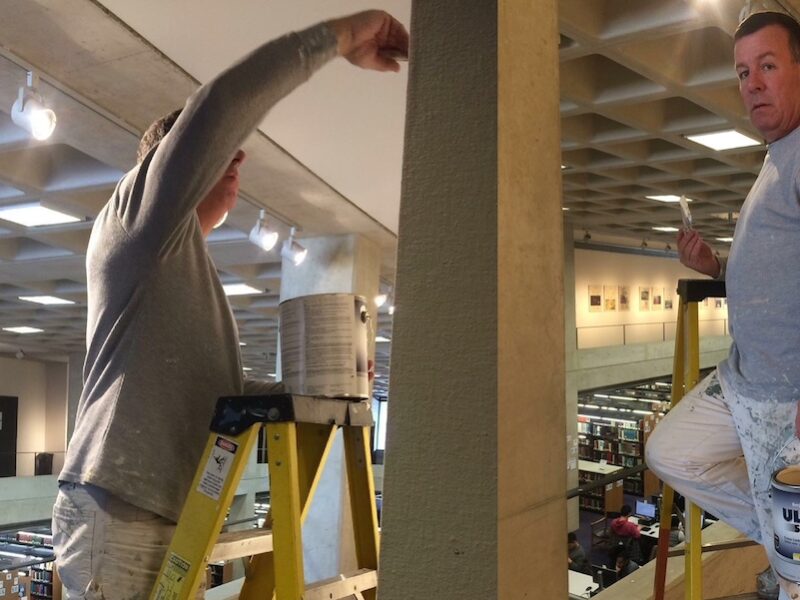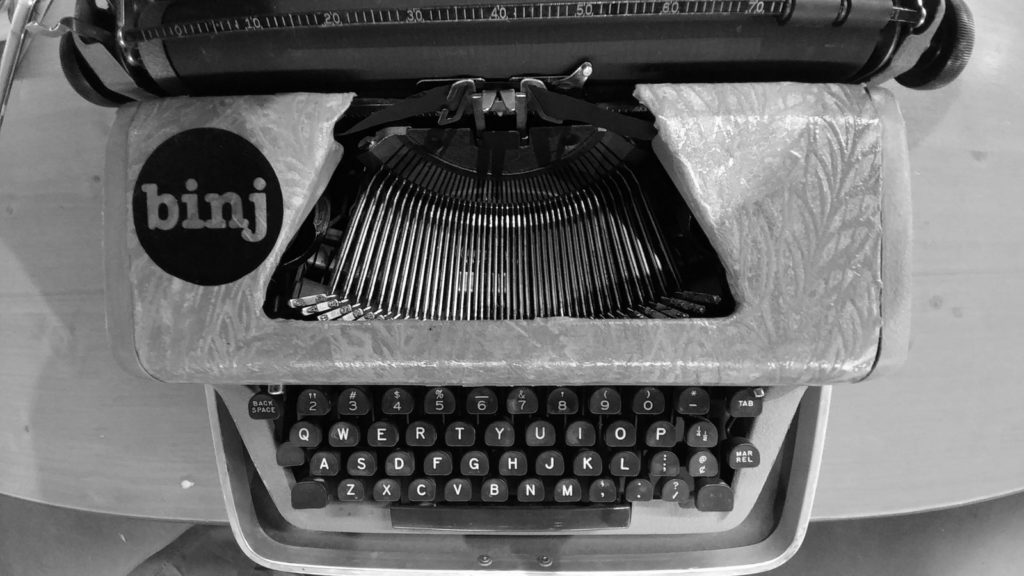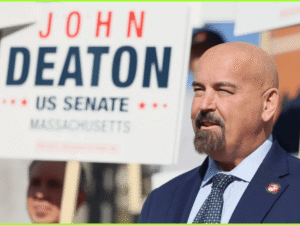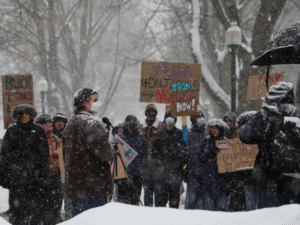A ‘Save UMB’ profile
We sit in the Ryan Lounge, a capacious, high-ceilinged hall with a harbor view. It’s a favorite hang-out for UMass Boston students, as well as one of the most popular spaces on campus for conferences and special events. The podium at the front of the lounge has hosted numerous internationally renowned scholarly gatherings. The backside of the room now has a student prayer space.
John Flaherty painted all the walls of this place, front and back, top to bottom.
Indeed, there is hardly a painted surface on the UMB campus that John’s brush has not touched. He has worked here for 19 years.
It used to be that Flaherty was part of a crew of five UMB painters. Together they handled everything from repainting offices for new faculty hires to cleaning up the occasional graffiti to preparing the campus for open houses, making sure that visitors would get only the best impression.
These days Flaherty is UMass Boston’s last remaining painter, one worker trying to keep up with the work previously done by five.
“My office is bombarded with work orders,” he tells me.
Last month, Flaherty was informed at a facilities department meeting that he will no longer be around to fill those work orders: His painting job was being eliminated.
When he got the news, Flaherty was completely shocked. Driving home to Braintree that day, John was so distraught that he missed his exit. “I ended up down the Cape.”
“You feel like the rug has been ripped out from under you.”
The Hidden Costs of “Savings”
Doing the work of five has taken a physical toll on Flaherty. Over the years, he has sustained several serious work-related injuries, from an ACL tear after a ladder fall in 2009 to a recent hip replacement. Hauling ladders, straining to reach difficult spots, swinging a brush for eight hours a day—it’s hard work. Yet John’s plan was to keep working at UMB for at least another decade. “I felt better than ever.”
But now, like dozens of laid-off UMB staff, Flaherty is not feeling well at all. He faces a future of unemployment, likely reduced pay, uncertain health benefits, and insecurity. He’s been doing the math.
“I’m 53. With what they’re paying out there, I’ll need at least two jobs now to make ends meet.”
Flaherty takes pride in the quality and the efficiency of his work. Most days he’s at work by 6 am. “I paint an entire office in just one day,” he tells me. “I’ll get like four or five offices prepped, and then knock them out.”
John also values the UMass Boston community. A South Boston native, Flaherty grew up in the local projects and recalls playing basketball on the UMB courts as a youth. “I always like talking with the people. I see that as part of the job too.”
John questions whether the new admin plan for facilities—to replace in-house UMB painters and other workers with privatized outside contractors—can match either his work efficiency or his connection to the community.
“They’re going to lose money,” he predicts. The way Flaherty sees it, the cost of profit taking and private insurance for outside workers (who must still by law be paid the prevailing union wage) will add up to more than UMB is presently paying him, benefits included.
Flaherty’s present salary is a mere $55,000 per year, after 19 years of service. As he informs me, no front-line worker in facilities, a department hit by several recent layoffs, is making more than $65,000 per year.
Rather than improving efficiency in the actual work done, John insists that any “savings” from this privatization plan is likely to come from two related sources: shifting of costs to the department level and increased neglect.
“Bottom line is: They’re going to do less work,” a move that he says will likely cost the campus more in the long run. After all, fresh paint is not only about appearances, but about protecting the underlying surfaces from deterioration.
“They’re looking at today. But not next year.”
The current facilities reorganization plan involves shifting the costs of painting work to the individual campus departments where the work is ordered, rather than having a central facilities department pick up the tab. But in a period of budget tightening—directly linked to stagnating and declining state funding for public higher education across Massachusetts—this restructuring is likely to reduce the number of work orders entirely, resulting in an overall neglect of painted surfaces on campus. Departments will tend to choose photocopying or phone lines over fresh paint.
“The common areas especially will take a hit,” Flaherty predicts, as they are likely to fall in the cracks between individual departments.
Common areas like… the Ryan Lounge?
Looking around one of UMB’s more popular multiuse common spaces, I wonder, how does the spirit and morale of a community suffer when its surfaces are left to crack and peel?
What message does it send to young scholars when their study and social spaces are left to neglect?
Does it matter if there are paint chips on your prayer mat?
Who Will Get the Work? Who Will Pay the Price?
Like many at UMB these days, Flaherty is wondering what is really motivating this privatization push at Boston’s only public university. Is it about undermining the strength of campus unions? Could it be about handing out profits to the lucky firms who get the outside contracts?
“Who is going to get the workload?” he asks.
Will the contracts go to personal friends and associates of UMass upper management, or the board of trustees?
Rather than saving money for the campus, will UMB merely end up handing more profits to the owners of those private companies?
Make no mistake, John Flaherty is concerned and frustrated about his situation. In an economy where ageism runs rampant, and with housing and private health insurance costs going through the roof, he has plenty to worry about. But John seems more worried about others than himself. Specifically, Flaherty mentions two laid-off staff members, both women, who are presently the only means of support for seriously ill partners, including one spouse with stage 4 cancer.
“They’re going to lose their medical insurance in two months. What are they going to do?”
“I don’t want to see anyone lost,” he says, adding, “I’m all for the union.”
Flaherty says he supports the demand of the UMB unions, who have joined together as part of the Coalition to Save UMB to call on UMass President Marty Meehan and the board of trustees to immediately reverse these layoffs by drawing just $5 million from the UMass system’s $96 million in unrestricted central reserves. That $5 million could save John’s job, and the jobs of so many others.
But if cuts have to be made, Flaherty wonders, why can’t they be made at the top first?
“We’re top-heavy,” John tells me, and proceeds to break down his long-time home: the facilities department. As Flaherty describes it, a mere 20 workers are now responsible for maintaining eight large buildings—inside and out—and yet there are five directors or deputy directors, as well as a vice chancellor, each collecting generous, often six-figure salaries.
Flaherty does not impugn the work ethic of anyone in facilities—he respects all his colleagues. Still, he sees the incongruity as a slap in the face. While upper administrators at UMB can leave with as much as a full year of severance pay and six-digit pensions, he and his fellow front-line workers are looking at a mere two months of coverage before they must go it alone. “Why can’t they trim from the top rather than cutting from the bottom?” he asks.
“The truth is,” John says of facilities, “We should be hiring more people. The campus is expanding. We need more people just to handle the everyday needs.” Currently time-sensitive repairs like plumbing leaks and power outages often cannot be performed as quickly as they should. “We already got work orders for University Hall,” he says, referring to UMB’s newest academic building.
“The way things are already, people have to wait to get the power back on. That’s suffering that they shouldn’t have to deal with.”
Listening to John Flaherty share his story, in the Ryan Lounge he painted, I am struck by his expertise and his clear concern for the mission of UMass Boston. It is hard to imagine how our campus could be better off without him.
UMass President Marty Meehan can be contacted at mmeehan@umassp.edu or 617-287-7050. Board of Trustees Chair Robert Manning can be contacted at rmanning@umassp.edu or 800-637-8255.









